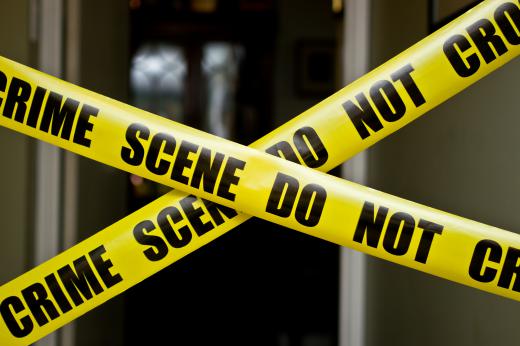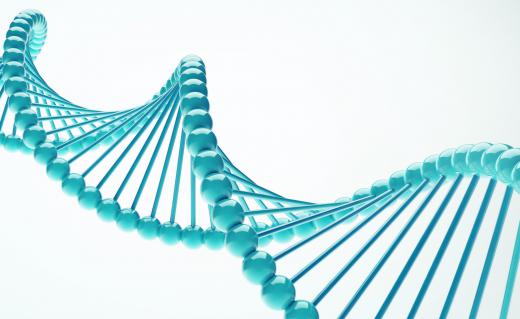What is DNA Forensics?
 Mary McMahon
Mary McMahon
Deoxyribonucleic Acid (DNA) forensics is a branch of forensic science which focuses on the use of genetic material in criminal investigation. In addition to assisting with human crimes like rape and murder, DNA forensics can also be used to track food-borne epidemics, identify endangered species in shipments of smuggled material, and to trace the history of humans around the world, among other things. Employment in the field of DNA forensics is incredibly varied, although it can be competitive, thanks to television shows like CSI which have raised general public interest in DNA forensics.
DNA is a nucleic acid which contains genetic information. All organisms carry varying amounts of DNA, and the substance contains a vast amount of material which dictates things like how many fingers the organism will have, or what color its hair or fur will be. Laboratory techniques can be used to identify and isolate DNA and then to sequence it. DNA sequencing involves figuring out the order of the four nucleotides in a string of DNA. Several laboratories have focused on sequencing all of an organism's DNA in an attempt to learn more about all members of its species.

In addition to being used to learn more about a species in general, DNA sequencing can also be used to identify specific individuals. In humans, there are around 13 DNA regions which can be used to identify someone, as they are markedly different from person to person. These regions or markers are very useful tools when a crime has been committed, as they can place someone at the scene or exonerate someone else.

In DNA forensics, laboratory staff collect samples from the scene of a crime and analyze them, or put them into secure storage so that they can be used later. These samples include obvious biological material like blood and hair found on a crime scene, along with fingernail scrapings from the victim. They can be used to gather information about the perpetrator, and if a suspect is identified, samples of his or her DNA can be collected for comparison. This is sometimes called “DNA fingerprinting,” because it takes advantage of the unique fingerprint of DNA markers which every human has.

Television shows often glamorize the role of DNA forensics in criminal investigation. While it is certainly an effective and useful tool, it is not a magic bullet. Criminal investigators use this forensic field as a supplement to numerous other criminal investigation techniques in the hopes of identifying and punishing criminals.
AS FEATURED ON:
AS FEATURED ON:














Discussion Comments
I know that DNA analysis is used in forensic science, but I had no idea that it helped with epidemics and human history too. How is DNA used in these cases specifically?
For example, in food-borne illness, how can DNA research help? I guess we're talking about the DNA of the illness causing bacteria right? Is this like finding out how Mad Cow Disease bacteria spread to animals and humans? By seeing how the DNA mutated?
This is so interesting. I used to think that DNA is just important for biology class or for the police. I didn't know it had so many different uses.
@turkay1-- My brother works in this field and he always says that CSI isn't realistic. He actually gets really upset with these shows because it gives wrong impressions and raises expectations for forensic and law enforcement teams that aren't realistic.
One thing he always tells me is that DNA forensics work takes a long time. The truth is that our law enforcement forensic labs don't have enough resources to get work done as fast as they show on CSI. It definitely doesn't happen in a day, more like weeks and months.
My brother says that sometimes DNA evidence can take a year to process because the DNA logs don't carry many DNA. If I remember correctly, something like 3% of the US population's DNA is in there. And the computers don't do all the work themselves. They have equipment to analyze the DNA, which gives them a code. And then someone has to manually enter that code to another computer to run a search.
So these shows really are far from the truth. It's nice that CSI has gotten more people interested in this field. But DNA forensics is more work than fun, that's for sure.
Do you really think that the use of DNA in forensics is overemphasized on TV?
All I know about criminal investigation and forensic science is through television shows like CSI and the like. I know that law enforcement have to use many different resources and techniques to solve crimes, but it does seem like DNA forensics is a breaking point.
In these shows, they often show law enforcement stuck in cases and not knowing what step to take next when a new lab report comes in putting a new individual at the crime scene or matching someone's DNA with someone else's. This adds a new light to the investigation and law enforcement might be able to solve the case with the new information.
Isn't this how it works in reality? Any law enforcers here who can tell us a little bit about how forensic DNA evidence really works?
Good informative post! It really helped me in my research!
Post your comments